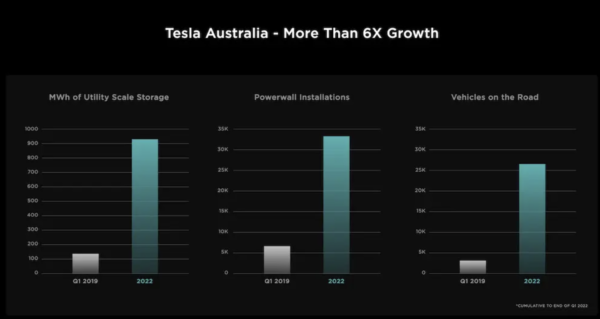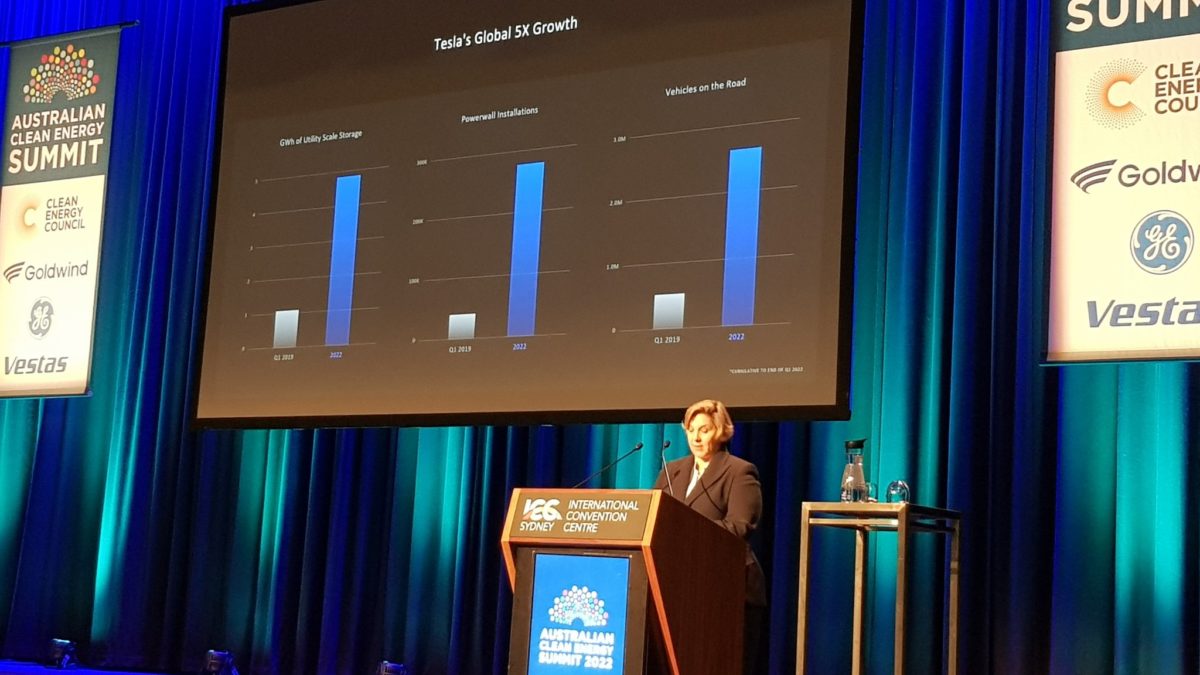Speaking at the Clean Energy Summit in Sydney today, Tesla chair Robyn Denholm pointed out Australia’s unique position of having more Tesla Powerwall home batteries installed than it has Tesla electric vehicles on its roads.
Australia has installed more than 33,000 Tesla Powerwall home battery systems to date, accounting for a nearly 12% share of the company’s total global installations.

Image: Tesla
On the other hand, Australia has only around 26,500 Tesla electric vehicles (EVs) on the road so far – though Denholm said momentum is growing rapidly. “I personally wouldn’t be surprised if we double that number by the end of the year,” she said. This would equate to more than 50,000 vehicles.
While its EVs are coming from a smaller base, the growth across all of Tesla’s key markets in Australia has been massive –increasing roughly six-fold since 2019. This is slightly higher than its average global growth, which Denholm outlined was around five-fold.
Amusing as Australia’s storage predilections may be, Denholm also iterated another point of difference: Australia currently produces 50% of the globe’s raw lithium, making it the largest producer, but accounts for just 7% of the refined lithium products.
Tesla’s Denholm Says Australia Is Key to Avoid EV Battery Crunch https://t.co/l1FsHTZk7h pic.twitter.com/T0fKv3RGGT
— World News Guru (@worldnews_guru) July 19, 2022
She urged leaders to focus on translating the country’s mineral wealth into a large-scale battery manufacturing industry. “The world the world simply cannot build battery cells fast enough,” she said.
“I can’t think of a technology that’s more important than lithium-ion batteries right now,” Denholm added. “To meet the challenge of climate change this entire industry needs to scale at sprinting pace.”
Tesla alone expects to need more than 3 TWh of lithium-ion batteries for EVs and energy storage by 2030 – three times the current global capacity which sits at around 1 TWh.
Instead of continuing to “hedge our bets with coal” through the introduction of measures like a capacity market, Denholm believes Australia would profit from focussing on battery storage and bringing more of the value chain onshore.
This content is protected by copyright and may not be reused. If you want to cooperate with us and would like to reuse some of our content, please contact: editors@pv-magazine.com.









By submitting this form you agree to pv magazine using your data for the purposes of publishing your comment.
Your personal data will only be disclosed or otherwise transmitted to third parties for the purposes of spam filtering or if this is necessary for technical maintenance of the website. Any other transfer to third parties will not take place unless this is justified on the basis of applicable data protection regulations or if pv magazine is legally obliged to do so.
You may revoke this consent at any time with effect for the future, in which case your personal data will be deleted immediately. Otherwise, your data will be deleted if pv magazine has processed your request or the purpose of data storage is fulfilled.
Further information on data privacy can be found in our Data Protection Policy.